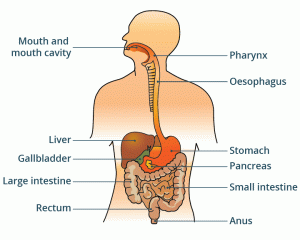 Many people with migraine have an adversarial relationship with their gut. During an attack, it can cause stomach and abdominal pain, nausea, an overly full sensation, and more. But why would a disorder that causes crippling headaches affect the gastrointestinal (GI) tract so severely?
Many people with migraine have an adversarial relationship with their gut. During an attack, it can cause stomach and abdominal pain, nausea, an overly full sensation, and more. But why would a disorder that causes crippling headaches affect the gastrointestinal (GI) tract so severely?
Vince Martin, MD, AQH, Director of the Headache & Facial Pain Center at the University of Cincinnati Gardner Neuroscience Institute, spoke at the 2024 Migraine World Summit and explained some of the varied reasons people living with migraine also struggle with gut issues.
The association, he says, relates to the autonomic nervous system, especially the vagus nerve. It’s often called the gut-brain superhighway, since it extends all the way from the brain and down into the GI tract. That means many of the same neurochemicals involved in migraine are also found in the nerve cells of the gut.
Some of the main players are serotonin, which we know is important in migraine; glutamate, another neurotransmitter involved in attacks; and CGRP (calcitonin gene-related peptide, a key component of new preventive treatments). They’re all found in the gut in large quantities.
There are also neurologic connections between the trigeminal system, the main nerve involved in migraine, and the center in the brain that controls nausea. When that center gets activated, nerves that go to the stomach cause the organ to stop contracting, and that gives you the feeling of nausea.
Gastroparesis, the loss of contraction, is a common side effect of a migraine attack. Normally, the stomach contracts to propel the food into the small intestine. But when someone has a migraine attack, those contractions may stop, and the stomach just kind of sits there. It can lead to issues with nausea, but it can also lead to problems with drug absorption. Some of the oral pills that migraine patients take may not actually be absorbed if the person has gastroparesis.
It’s also possible that these symptoms could manifest outside of a migraine attack. People with migraine may chronically feel full easily or lose their appetite, they may have some pain in their stomach region, and they become easily nauseous.
One lesser-known form of migraine is called abdominal migraine. People develop pain in their epigastrium, which lies just beneath the sternum in the abdomen; they can have recurrent bouts of abdominal pain with or without “classic” migraine symptoms.
This can occur repetitively and may even stump gastroenterologists trying to diagnose the problem. They look for other pathology like gallstones or liver problems, but they don’t find anything significant. And that’s because the diagnosis is really one of exclusion. Once they’ve done their full gastrointestinal evaluation, and particularly if the patient has a history of migraine, then the pain could be called abdominal migraine.
There’s another factor to consider, too, which is the microbiome; it’s basically the collection of all the bacteria that live in your gut. The microbiome changes on a daily basis, as it’s linked to your diet, whether you’ve had any recent antibiotics, and a number of other factors.
The bacteria are a mix of anti-inflammatory and pro-inflammatory types. So, it’s the ratio between the good and the bad bacteria and the substances they produce that may promote or inhibit gut inflammation. And since what happens in the gut can influence what happens in the brain, this balance between good and bad becomes very important.
A lot of healthy lifestyles — diets rich in fruit, vegetables, and fiber — promote the healthy bacteria in your gut. If you eat a poor diet with lots of carbohydrates, sugars, and unhealthy fats, though, it creates an unhealthy environment, and you may struggle with gut symptoms.
And if you’ve been on broad-spectrum antibiotics for a long period of time, they can wreak havoc on the GI tract and the ratio of bacteria in the microbiome. It can throw you into a bad pro-inflammatory state for a long period, and perpetuate the migraine attacks.
More research needs to be done to discover the intricacies of the gut-brain system and how it affects migraine attack symptoms and migraine as a whole.

Leave a Reply